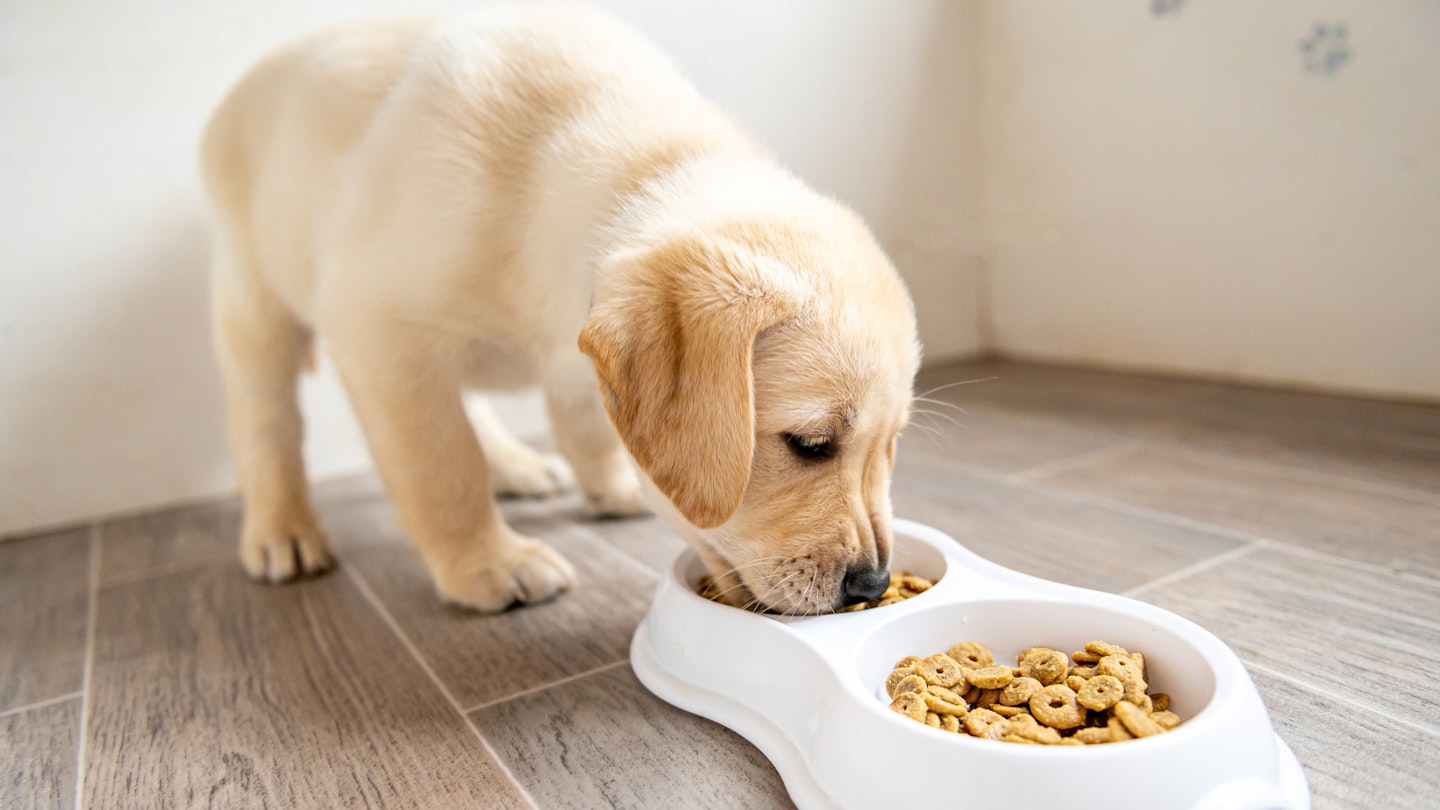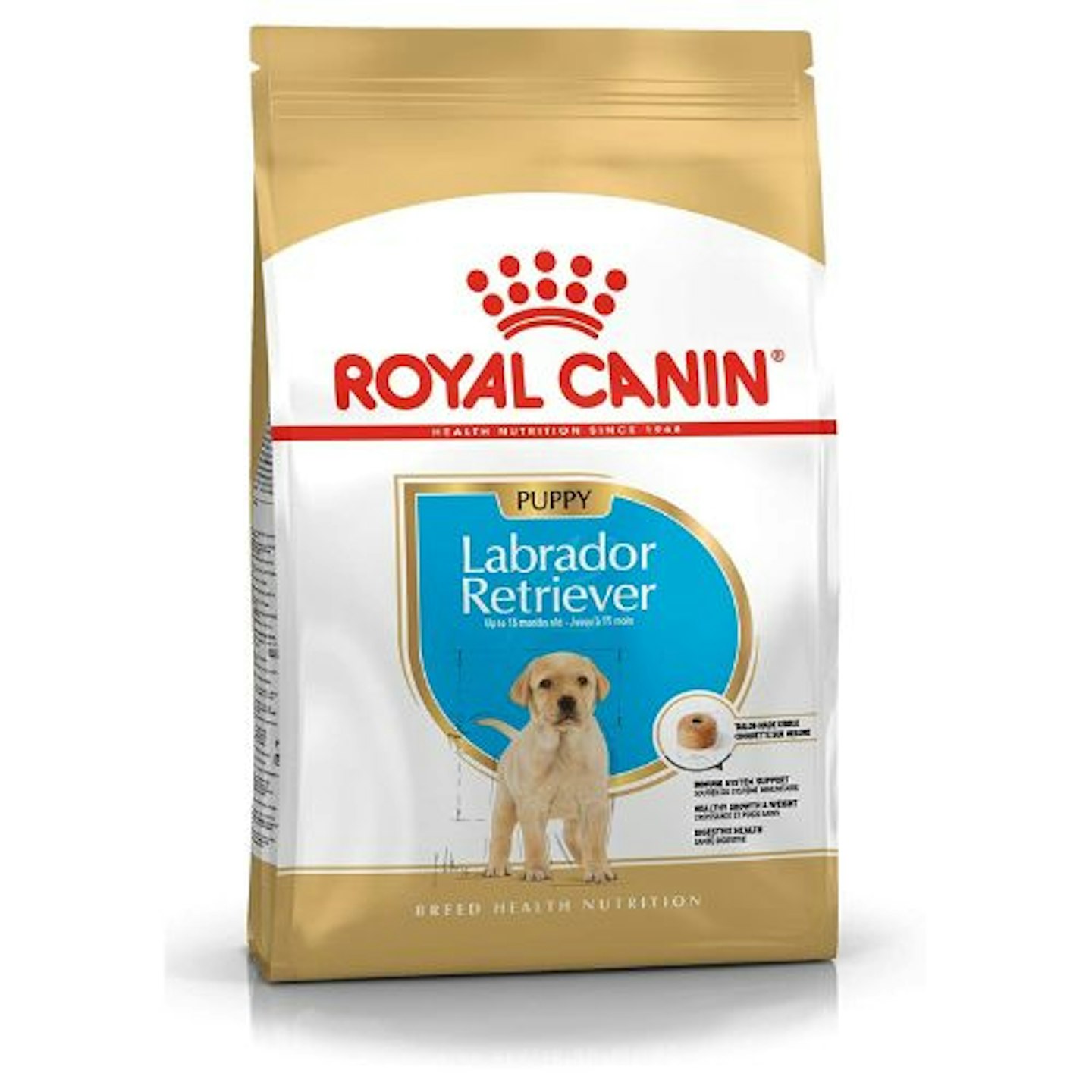Finding the best food for a Labrador puppy is paramount to their growth and development. Labradors are classed as large breeds, weighing over 25kg when full-grown. Their puppy food needs to support their growth as well as prevent skeletal problems later in life. So, Take a Break Pets have put together this guide to giving your Lab puppy the best start in life - with the help of Dr Linda Simon, the resident veterinarian for Pooch & Mutt.
In this round-up, we have got the facts on large breed puppy food, how to keep your Labrador healthy and how to avoid any long-term health issues, such as joint disease in their older age. After all, studies have shown that Labs "do best when we do not overfeed them, and they are slim", says Dr Linda Simon. So, she says that the most important thing is that "they are not overfed". When it comes to labrador puppy food, "any complete puppy food is fine".
From wet to dry puppy food, it's crucial dogs get the proper nutrition as a puppy. In addition, instilling the correct eating habits for large-breed dogs should start as soon as your pup is weaned. If you're choosing dry over wet puppy food, ensure that the kibble is puppy-sized for its growing teeth and doesn't contain too much calcium. After all, too much calcium can cause permanent bone damage - such as hip dysplasia - in large-breed dogs. We've got some more details on that below.
Best food for Labrador puppy at a glance:
• Best dry food for Labrador puppy: Royal Canin, Labrador Puppy Dry Mix - View on Amazon UK
• Best wet food for Labrador puppy: Wainwright's, Wet Puppy Food Variety Pack - View on Pets at Home
• Best complete puppy superfood: Pooch & Mutt, Puppy Complete Superfood - View on Pooch & Mutt
• Best hypoallergenic large-breed puppy food: AVA, Large Breed Dry Puppy Food - View on Pets at Home
When you bring your puppy home, it's one of the most unforgettable moments of your life. The trouble is, you may be caught up in the magic and forget about what to buy your puppy. So, we're determined to make it easier. After you wean your little bundle of joy off puppy milk, you can feed them puppy food for up to around 12 months. This will help them grow but will also shape future eating habits. So, with this in mind, we've found the best food for your Labrador puppy.
Best food for a Labrador puppy
Best dry food for Labrador puppy
For dry food, why not consider Royal Canin, Labrador Puppy Dry Mix – 3kg? Not only does it provide digestion and immune support, but the kibble is tailor-made for your Labrador. Royal Canin recommends keeping them on this mix until around 15 months to give them the best start - a boost in regards to their healthy growth, weight and general health. Plus, this mix will help avoid excess weight gain and provides clear instructions on quantity.
Customer Review: "We have fed successive Labrador pups on this food. They've grown really well, they shouldn't get overweight as pups on this food (unless you overfeed them)their coats have always been soft and shiny and they've had no tummy problems. From 8 weeks, we started to introduce this food slowly, a small amount at a time until they were having all dry food and no more soft food and milk. We soaked it for a few minutes at first but I don't really think there's any need to. We went by the guidelines for quantity on the Royal Canin website. At 3 months, our current pup is having 300g a day, 3 meals of 100g. We put a bit of warm water with it to make gravy and plenty of fresh drinking water available all the time. Murphy is happy and healthy. Highly recommended."
Pros
- Avoids excess weight gain
- Contains prebiotics for digestion
- Tailor-made kibble for the breed
Cons
- Will need to be gradually introduced
Best wet food for Labrador puppy
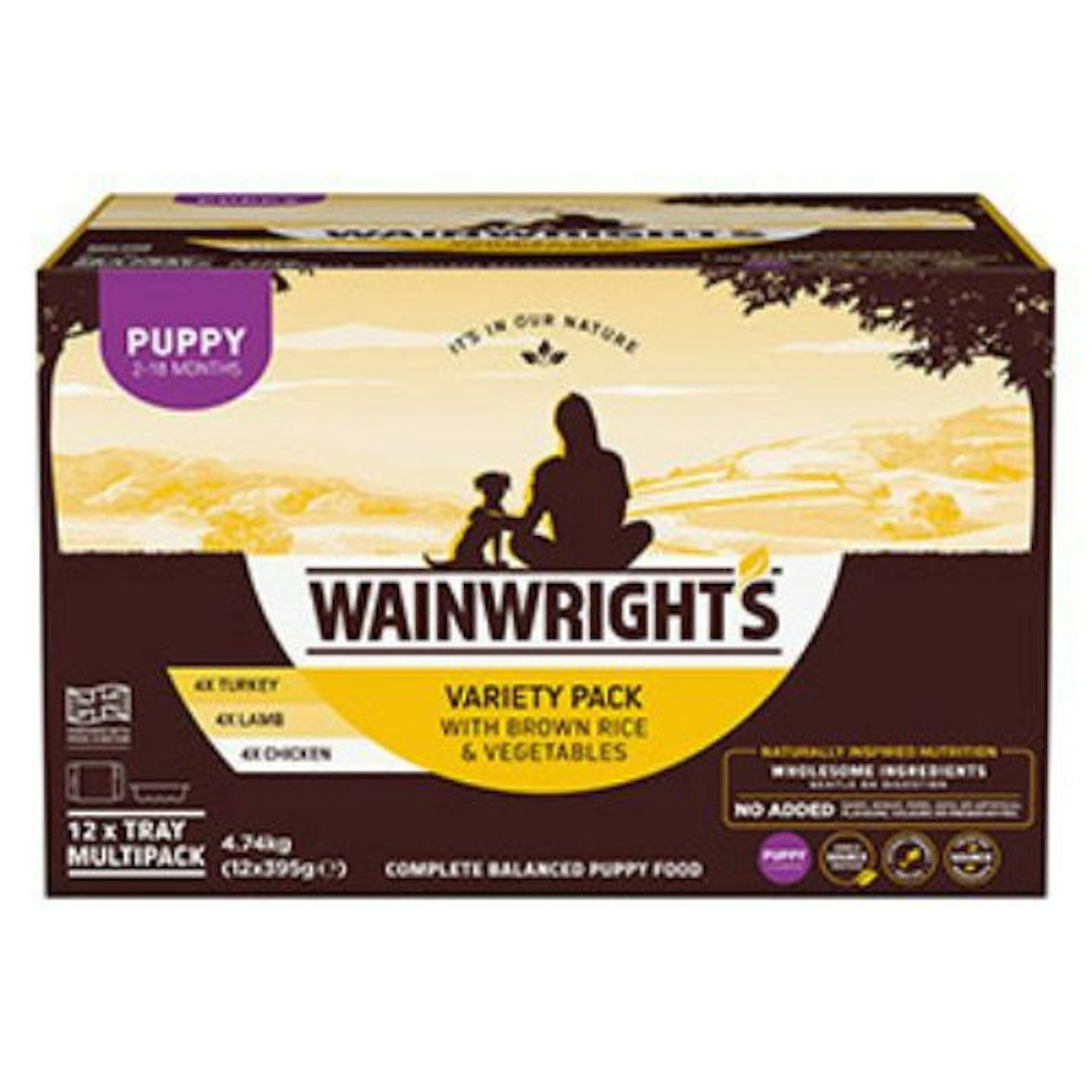
www.petsathome.com
For faithful friends that will grow into loyal and loving dogs, this wet puppy food contains 70 per cent protein to help them grow big and strong. Larger breeds grow a lot faster than smaller ones, so it is vital that you feed your puppy everything they need to help them grow strong and healthy. This Wainwright's Wet Puppy Food Variety Pack - 12 x 395g contains wholesome ingredients that are easy to digest - perfect for pups who are always on the move.
Customer Review: "My 12-week lab pup Freddy loves this food. Cleaned his plate in seconds. Different flavours for him to try. The only problem is it's a bit smelly but he doesn't seem to mind."
Pros
- Large portions
- Suitable for up to 18 months
- Gentle on digestion
Cons
- One reviewer felt the consistency was too mushy
Best complete puppy superfood
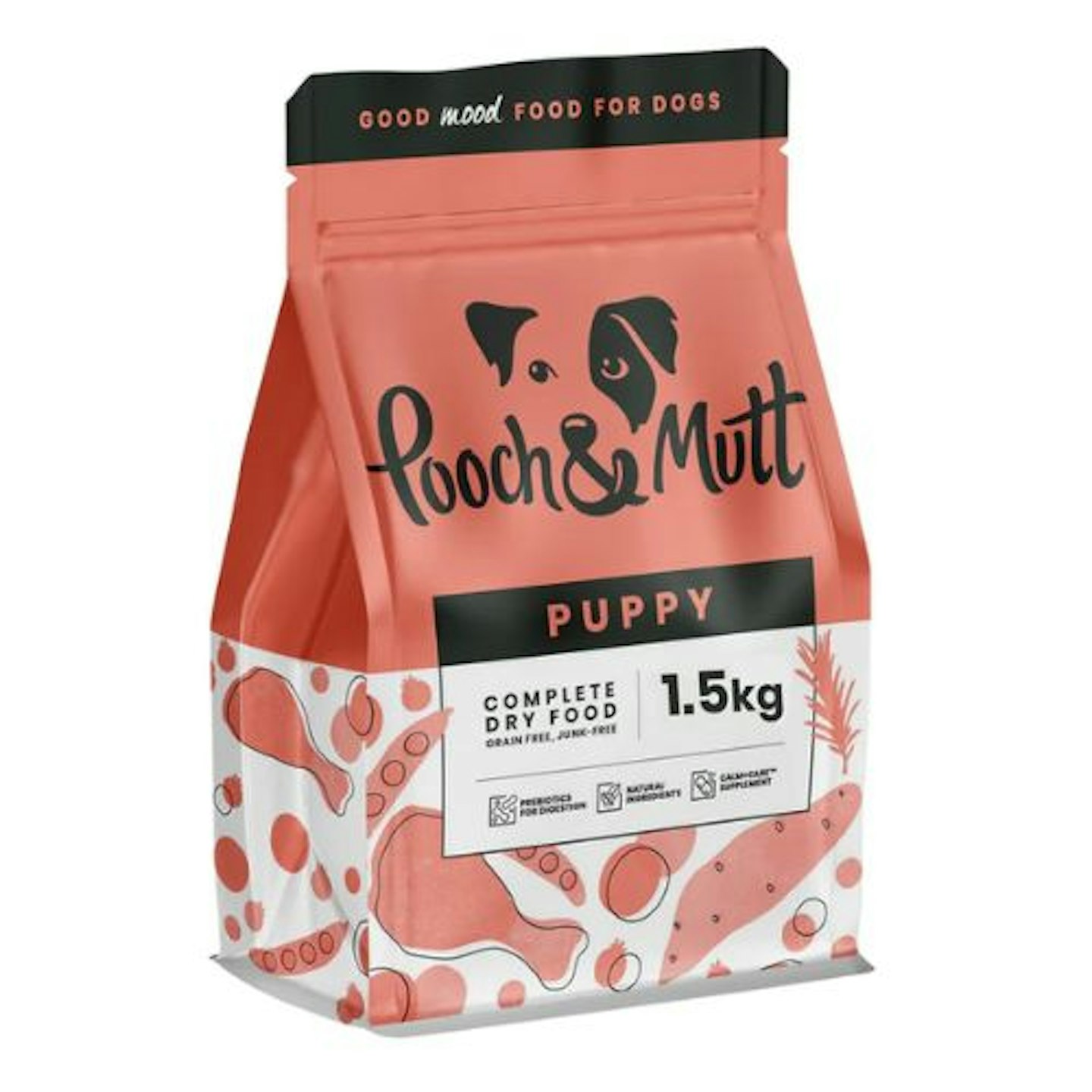
www.poochandmutt.co.uk
Now you can even get your hands on puppy 'superfood' - yep, you read that right. Pooch + Mutt, Puppy Complete Superfood – 1.5kg is packed full of prebiotics, natural ingredients and supplements. This puppy food will make your pup's tummy feel good. These are enhanced natural foods that are worth the investment. Subscribe and save to make this a cost-effective and convenient option.
Customer Review: "This is perfect for two small chihuahua puppies. Full of quality ingredients and apparently very easy for them to eat, digest and - importantly - get rid of!"
Pros
- Rich in antioxidants
- Grain-free and junk-free
- Hypoallergenic and natural
Cons
- Only one flavour
Best puppy food to aid digestion
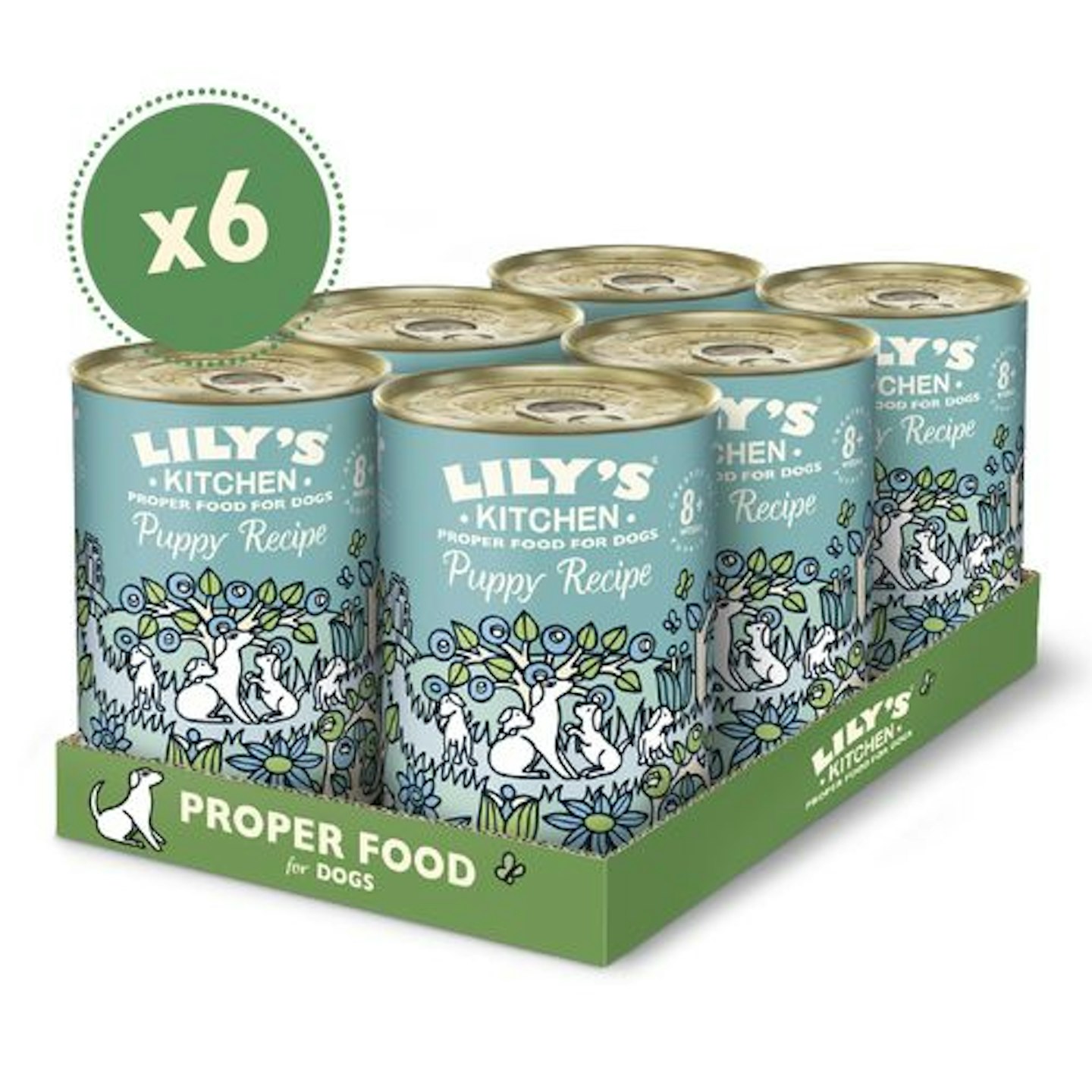
www.lilyskitchen.co.uk
Want more bark for your bite? Lily's Kitchen is known for its high meat content and lack of dog food 'fillers', meaning you're getting good sustenance for your pooch. Lily's Kitchen, Turkey + Duck Puppy Recipe – 6 x 400g is made up of all-natural ingredients, including fresh meat, vegetables and herbs, plus all the vitamins and minerals your Labrador pup needs to be healthy and happy as they grow. Plus, it contains botanicals that will aid digestive health.
Customer Review: "My puppy loves this food. He was on raw when I got him but he wouldn't eat it and wanted to be hand fed. One bowl of this and he's hooked, he loves it. The smell is actually nice too, and as I don't normally like dog food smells and really gag, it was a pleasant surprise, reminded me of a roast dinner."
Pros
- Grain, dairy and wheat-free
- Health, natural ingredients
- Botanicals to aid digestion
Cons
- You need to spend over £29 for free delivery
Best with high-quality protein
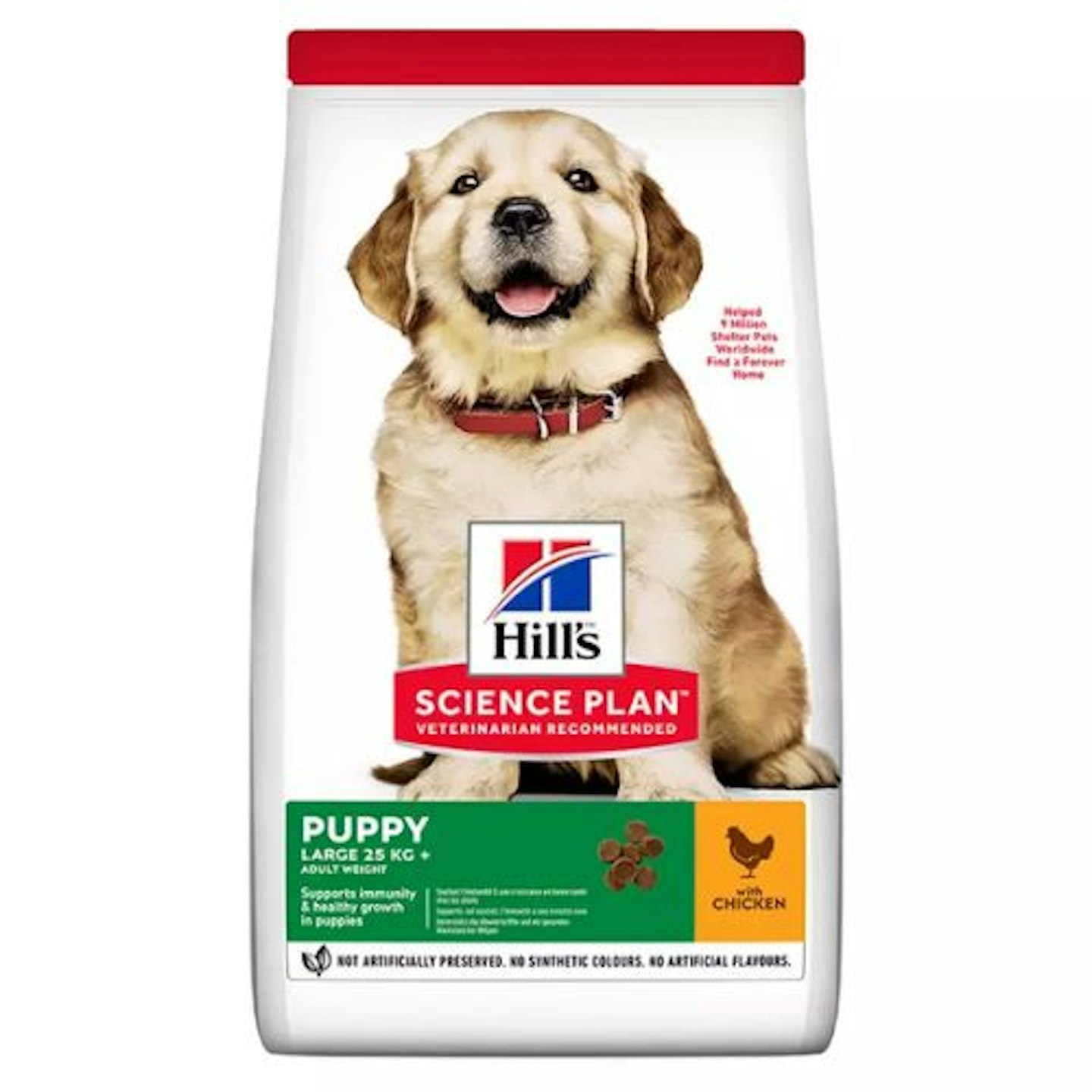
www.petsathome.com
Give your playful Lab pup the best and see its tail start wagging. This delicious Hill's Science Plan, Large Puppy Dry Dog Food - 12kg provides high-quality protein for building lean muscles, DHA from fish oil for healthy brain and eye development, and balanced minerals for strong bones and teeth. Just as their powerful personality is developing, your dog's body needs the right building blocks to grow too, and Hill's Science gets our paw of approval.
Customer Review: "Puppy loves this food - Helped her gain weight at a healthy pace and keeps her feeling fuller for longer - coat, skin, eyes and teeth all looking healthy after being on this food - Brilliant value for money considering Pets at Home charge £45 (ish) for this size. - Our older dog has now gone onto the adult (small dog version food) and he is loving it too."
Pros
- Balanced minerals for strong teeth and bones
- High-quality protein for building lean muscles
- DHA from fish oil for brain development
Cons
- When bulk buying a large bag, you need to make sure you've got plenty of room to store it and the correct storage method to keep it fresh
Best value wet puppy food
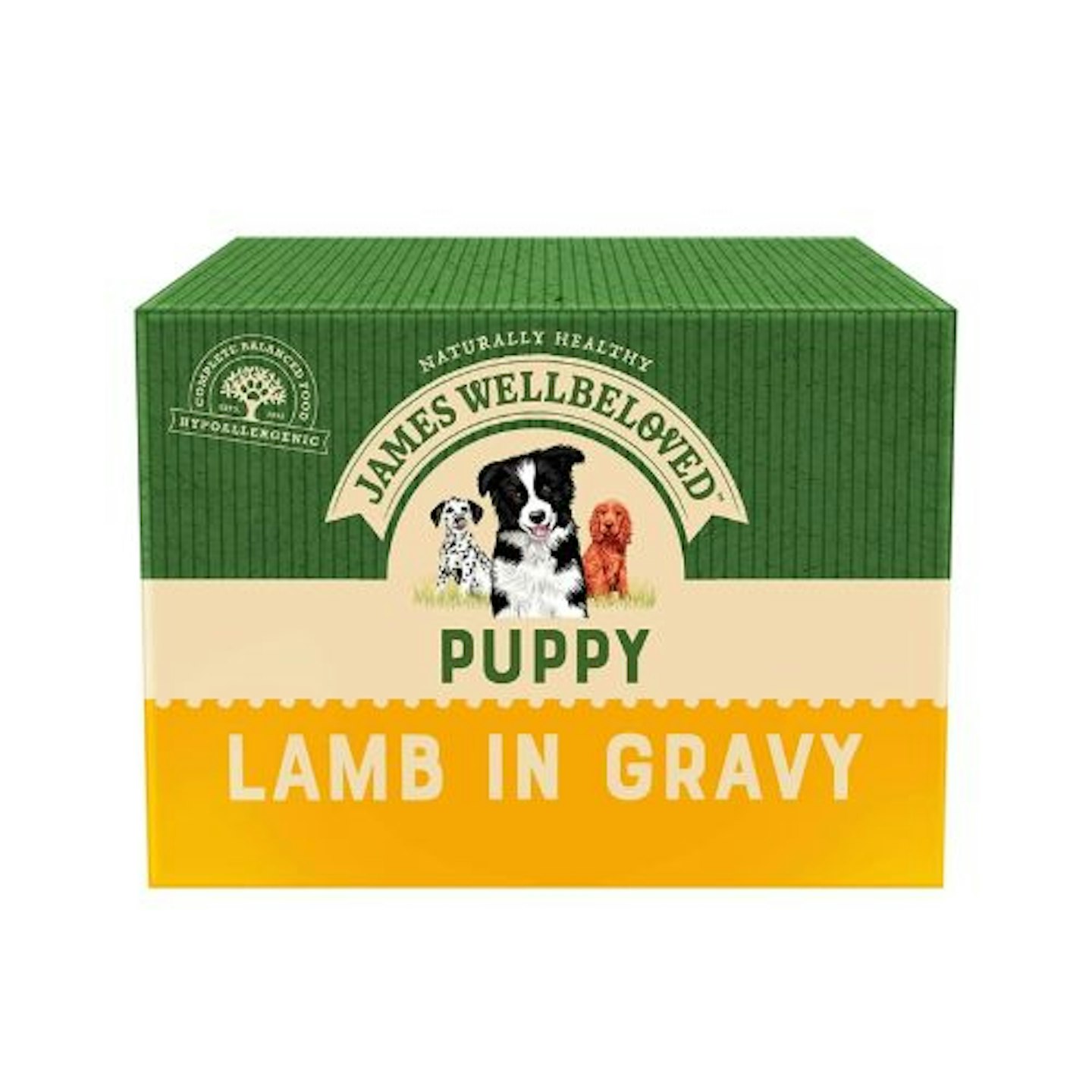
Hypoallergenic wet dog foods are made from ingredients that are less likely to cause allergies and intolerances, as well as using highly digestible single proteins. James Wellbeloved, Puppy Lamb in Gravy Pouches – 10 x 150g is an excellent choice for pets with sensitive tummies or allergies from birth. Made from natural ingredients, with added vitamins and minerals, including Omega 3 oils, to help promote a healthy, glossy coat. Tasty, healthy and good value.
Customer Review: "I have a malamute puppy and after searching for such a long time I finally found a product with only positives. Honestly couldn't recommend this enough, he absolutely loves it. I mix half wet and half kibble from the same brand with a pump of salmon oil (salmon oil only once a day). The firm stool gives him lots of energy and he always begs for more."
Pros
- A great value choice for fussy puppies
- Full of moisture and nutrients
- Balanced, complete for healthy support
Cons
- Smaller portions
Best hypoallergenic large-breed puppy food
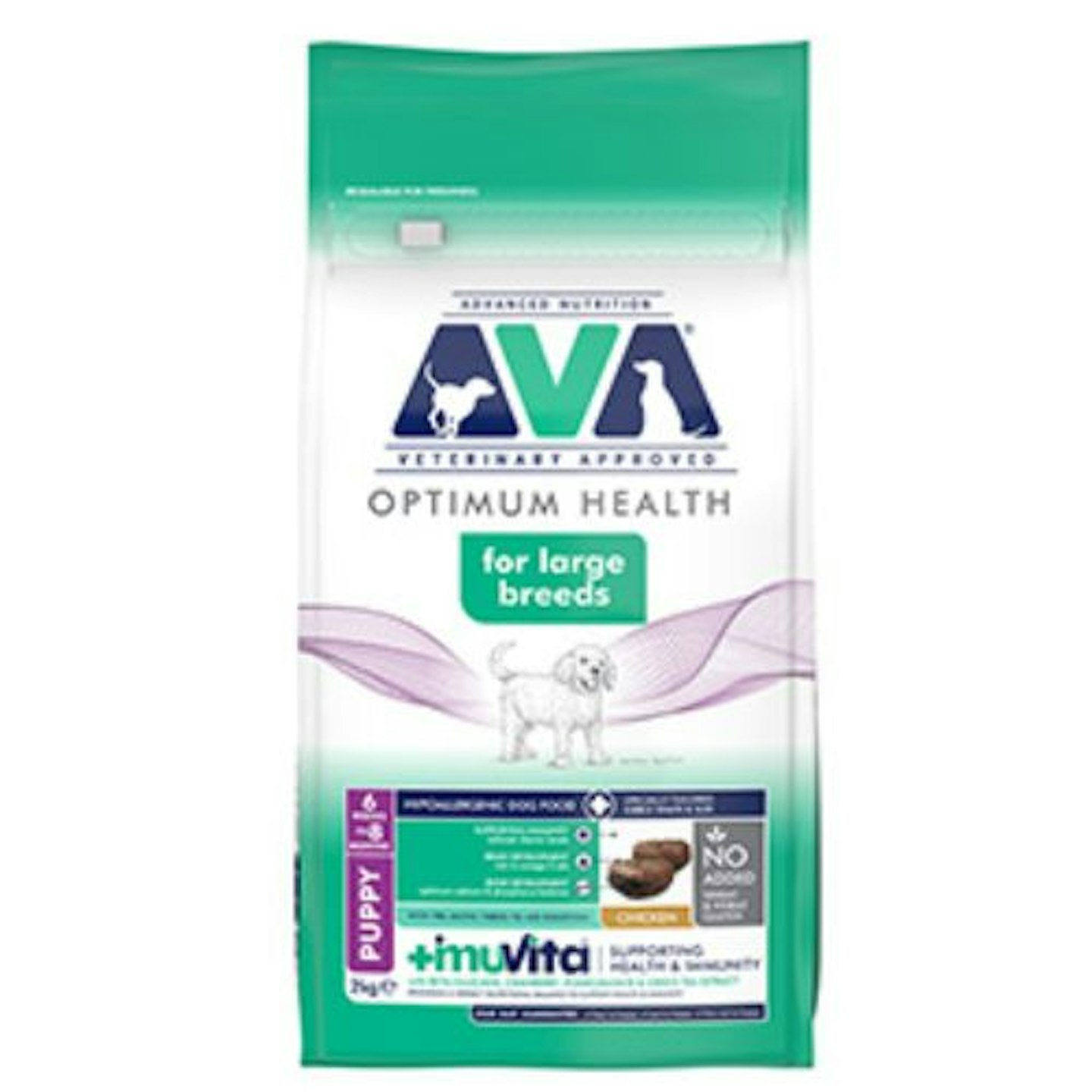
www.petsathome.com
For bounding puppies that are bursting with vitality, choose AVA, Large Breed Dry Puppy Food – 2kg. This complete food is packed with vitamins, minerals, and fatty acids that are tailored to the nutritional requirements of large-breed dogs like your Labrador puppy. Also, this kibble is hypoallergenic, so it's a good option if your puppy is showing the symptoms of a sensitive stomach. You can Subscribe and Save with Pets at Home.
Customer Review: "The biscuit size is bigger than expected but for large breed dogs I am sure it is correct. My Akita X loves the biscuits and eats all."
Pros
- Good value dry food
- Hypoallergenic recipe
- Digestible, natural mix
Cons
- Unclear feeding guide
VERDICT: What is the best food for a Labrador puppy?
If dry food suits your puppy best, we recommend Royal Canin's Labrador Puppy Dry Mix, which has been tailored for their tiny, chomping mouths. It gives them a much-needed boost early on – with regard to healthy growth, weight and general health. Plus, this breed-specific mix will help avoid excess weight gain and provides instructions on quantity
On the other hand, if wet food is preferred, we love Wainright's variety pack Wet Puppy Food. It contains lots of protein, and the ingredients make it easy to digest for your pup. Perfect for breeds that love to chow down and move around a lot, this wet food will support your loyal Labrador pup. Plus, there's a variation with a multipack.
FAQs
How much food does a Labrador puppy need?
"Food requirements will depend on the pup's weight and activity levels, as well as on the type of food they're eating," says Dr Linda Simon. It's all too easy to overfeed or underfeed your pooch.
Thankfully, many of our picks above keep things easy for us by having a feeding guide, which can be found at the back of the packet or online. Dr Linda Simon says: "It will give a feeding guideline that usually takes into account the pup's current weight and predicted adult weight."
Which food is not good for a Labrador puppy?
For puppies, we should steer clear of human foods, says Linda, "particularly those that are toxic or that can cause stomach upset, such as greasy foods, dairy products, grapes, raisins and onions".
Which health problems are common in Labradors?
Labradors make wonderful pets, according to Purina, as they're "easily attributed to their endearing personalities" and are often employed in service roles as guide dogs for the visually impaired. However, this doesn't mean that they don't come without problems. Labradors are currently classed as category two by The UK Kennel Club, which means that concerns should be raised ASAP.
There's no guarantee that your dog will get these problems, they're just more at risk. For prevention, acquire your pups from a reputable breeder that cares about the welfare of your pups. With this, ask about necessary screenings and tests. But, it's up to you to keep them happy and healthy with a "good, complete, and balanced diet and regular exercise", says Purina.
Hip dysplasia
Hip dysplasia is a condition resulting from abnormal formation of the hip socket, which causes the hip to deteriorate, says Purina. So, how do we spot this? Well, signs tend to include "difficulty going up or down stairs, lameness in the rear legs, a 'bunny hopping' gait, pain, stiffness, or limping". Unfortunately, this condition can lead to arthritis in the future – so we suggest screening your Labrador for this.
Elbow dysplasia
Elbow dysplasia is similar to the former - but with the elbow. Symptoms can include "forelimb lameness, pain when moving the elbow, possible joint effusion, and a decreased range of motion," says Purina. Surgery may be necessary if the condition worsens to restore range of motion. Again, we recommend screening this on potential Labrador pups with an elbow scoring scheme.
Arthritis
Arthritis is a common health problem in Labradors. This is a result of their size, and it puts a strain on their joints. So, Purina recommends keeping your Labrador "healthy through regular exercise and correct feeding." After, obesity can put excess strain on joints and increases the risk.
Laryngeal paralysis
Laryngeal paralysis restricts airflow "through the larynx and is caused by a change in the muscles within or surrounding this organ", says Purina. It can be caused by trauma to the neck or throat – or even hypothyroidism. This condition can take a few forms, such as a 'honking' sound when they bark, increased respiratory effort, coughing, and a lack of willingness to exercise".
Hypothyroidism
Hypothyroidism is an endocrine disorder – hormones – which is the result of the "lowered production and release of T4 and T3 hormones from the thyroid gland", according to Purina. Unfortunately, your Lab puppy is more at risk of this disease, and they may gain weight as a result. As well as this, your Labrador may lose their fur, experience lethargy and stay away from the cold.
Obesity
Obesity can be caused by your Labrador's penchant for chowing down – a lot. Luckily, it's easy to prevent, according to Purina. They suggest monitoring your pooch's intake to ensure that they aren't eating too much or too quickly. We recommend a slow feeder dog bowl to help them eat calmly. After all, obesity is a serious health issue with this breed and can lead to other issues.
Progressive retinal atrophy
This condition refers to a range of diseases that can "cause gradual deterioration of the Retina," according to Purina. Common in larger breed dogs, this condition can cause sight loss over time. Specifically, Purina claims that Labradors are prone to an inherited variation known as rod-cone degeneration, which can be fatal. Purina suggests looking for "cloudy eyes and behavioural changes in your dog".
Ear infections
Don't you just love a Labrador's big floppy ears? They're the cutest. Though an endearing element of their appearance, Purina claims that this breed is more susceptible to ear infections. For this, the pet care brand suggests: "Make sure you dry their ears after bathing and swimming and ensure that you regularly check inside their ears and eyes for signs of infection."
Heart disease
This issue is more common in older dogs, and signs will likely "display as fatigue, coughing, lack of appetite, swollen abdomen, breathing difficulty, and weight loss", says Purina. For example, Tricuspid valve dysplasia (TVD) is a common issue in Labradors, which mainly affects male dogs from birth. In severe cases, this can lead to heart failure. But, most dogs with mild TVD can live happily.
Piper Huxley is a Homes, Garden and Wellness Product Writer for Take a Break, specialising in pet health. When she's not barking about dog supplements, she's online devouring cat content.
